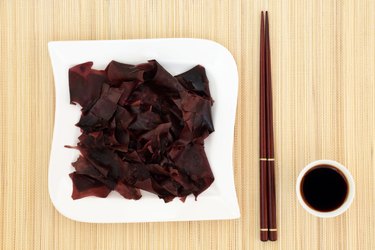
Dulse is an edible seaweed. Sometimes called "sea parsley," reddish-purple dulse is available dehydrated or fresh and is usually packed in salt. After being rehydrated for 5 to 10 minutes in water or rinsed to remove excess salt, dulse can be baked, stir-fried or added to soups and salads.
Dulse has nutritional value because it's low in calories and has some protein. It also has a decent amount of plant-based iron in it.
Video of the Day
Video of the Day
Dulse Nutrition
According to the USDA, a 1/4-cup serving of dulse seaweed will give you:
- Calories: 38
- Total fat: 0 g
- Saturated fat: 0 g
- Trans fat: 0 g
- Cholesterol: 0 mg
- Sodium: 243 mg
- Total carbs: 6 g
- Dietary fiber: 4 g
- Sugar: 0 g
- Protein: 4 g
Dulse Macros
- Total fat: A 1/4-cup serving of dulse seaweed has 0 grams of total fat.
- Carbohydrates: A 1/4-cup serving of dulse seaweed has 6 grams of carbs, which includes 4 grams of fiber.
- Protein: A 1/4-cup serving of dulse seaweed has 4 grams of protein.
Vitamins, Minerals and Other Micronutrients
- Iron: 22% Daily Value (DV)
- Vitamin A: 3% DV
- Calcium: 2% DV
Dulse Benefits
1. It's a Good Source of Iron
Iron is a mineral that's needed for healthy blood, and it allows oxygen to be transported throughout the body, according to the Harvard T.H. Chan School of Public Health. A 1/4 cup serving of dulse seaweed flakes will give you 4 milligrams of iron, which is 22 percent of your daily recommended value.
Nonheme iron, the type found in dulse, is not readily absorbed by the body, though you can increase the amount you absorb by eating it with foods high in vitamin C, per the Harvard T.H. Chan School of Public Health.
Tip
Try adding dulse to stews that have tomatoes or adding oranges into dulse salads.
2. It's Low in Calories and Has Some Protein
Dulse is a low-calorie food, with a 1/4-cup serving only giving you 38 calories. Dulse also has 4 grams of protein which is about 8 percent of the daily recommended value. This makes it a nutrient-dense addition to your diet.
Risks of Eating Dulse Seaweed
Watch Out for the Sodium
If you are concerned about eating too much sodium, you may need to limit how much dulse you eat per day.
Eating 1/4-cup of the seaweed provides you with 243 milligrams of sodium, or 11 percent of the daily value advised for adults. Eating too much sodium is linked to a higher risk of heart disease and stroke, and adults should limit the amount they take in to 2,300 milligrams per day, according to the USDA 2020-2025 Dietary Guidelines for Americans.
- Recipetips.com: Dulse Seaweed
- The Splendid Table: Seaweed -- It's Not Just for Wrapping Sushi
- Maine Coast Sea Vegetables: Nutritional Analysis of Maine Coast Sea Vegetables
- Linus Pauling Institute: Iodine
- University of Maryland Medical Center: Vitamin B-6 (Pyridoxine)
- University of Maryland Medical Center: Iron
- Linus Pauling Institute: Potassium
- Centers for Disease Control and Prevention: Most Americans Should Consume Less Sodium
- Harvard T.H. Chan School of Public Health: Iron
- USDA MyFoodData: Rising Tide Sea Vegetables - Dulse
- USDA: 2020-2025 Dietary Guidelines for Americans